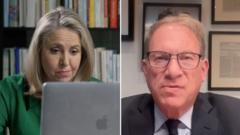Following the accidental inclusion of journalist Jeffrey Goldberg in a military-focused Signal group chat, US National Security Adviser Mike Waltz has taken full responsibility for the incident, which has drawn bipartisan criticism and sparked a lawsuit over potential record-keeping violations.
Mike Waltz Accepts Responsibility Amid Signal Chat Leak Controversy

Mike Waltz Accepts Responsibility Amid Signal Chat Leak Controversy
The US National Security Adviser admits oversight for a leak involving military discussions on a civilian messaging app.
In a startling revelation, US National Security Adviser Mike Waltz has accepted full accountability for a controversial Signal group chat leak that exposed sensitive military discussions. The chat, which included high-ranking officials planning military strikes in Yemen, inadvertently included journalist Jeffrey Goldberg, prompting serious questions about the security protocols in place for such discussions.
Speaking with Fox News, Waltz described the incident as "embarrassing" and confirmed that he personally constructed the group chat. He expressed confusion over how Goldberg was added, clarifying that he does not know the journalist and claiming that an unnamed contact was meant to be present instead. Waltz further stated that he has sought assistance from Elon Musk to investigate the situation and that technical experts are reviewing how the breach occurred.
Despite the seriousness of the content discussed, including military plans and strategies just hours before strikes were executed, President Donald Trump and several intelligence leaders downplayed the issue, asserting that no classified information was shared. Trump referred to the incident as a "glitch," suggesting it had no operational impact, while describing Goldberg's addition to the chat as an oversight involving someone at a lower level of Waltz's team.
Investigative responses from lawmakers, however, reflect a contrasting perspective. Some Democrats and Republicans are now calling for an inquiry into the leak, with Mark Warner, Democratic vice-chairman of the Senate Intelligence Committee, criticizing the incident as indicative of "sloppy and grossly incompetent" national security strategies.
In light of these developments, a non-partisan watchdog group has filed suit against officials involved in the group chat, claiming violations of the Federal Records Act due to the practice of automatically deleting messages. National security experts are raising alarms about the vulnerabilities of using civilian messaging apps, including Signal, for critical discussions among government officials.
As the fallout continues, this incident serves as a stark reminder of the potential risks associated with digital communication in high-stakes government operations.
Speaking with Fox News, Waltz described the incident as "embarrassing" and confirmed that he personally constructed the group chat. He expressed confusion over how Goldberg was added, clarifying that he does not know the journalist and claiming that an unnamed contact was meant to be present instead. Waltz further stated that he has sought assistance from Elon Musk to investigate the situation and that technical experts are reviewing how the breach occurred.
Despite the seriousness of the content discussed, including military plans and strategies just hours before strikes were executed, President Donald Trump and several intelligence leaders downplayed the issue, asserting that no classified information was shared. Trump referred to the incident as a "glitch," suggesting it had no operational impact, while describing Goldberg's addition to the chat as an oversight involving someone at a lower level of Waltz's team.
Investigative responses from lawmakers, however, reflect a contrasting perspective. Some Democrats and Republicans are now calling for an inquiry into the leak, with Mark Warner, Democratic vice-chairman of the Senate Intelligence Committee, criticizing the incident as indicative of "sloppy and grossly incompetent" national security strategies.
In light of these developments, a non-partisan watchdog group has filed suit against officials involved in the group chat, claiming violations of the Federal Records Act due to the practice of automatically deleting messages. National security experts are raising alarms about the vulnerabilities of using civilian messaging apps, including Signal, for critical discussions among government officials.
As the fallout continues, this incident serves as a stark reminder of the potential risks associated with digital communication in high-stakes government operations.






















